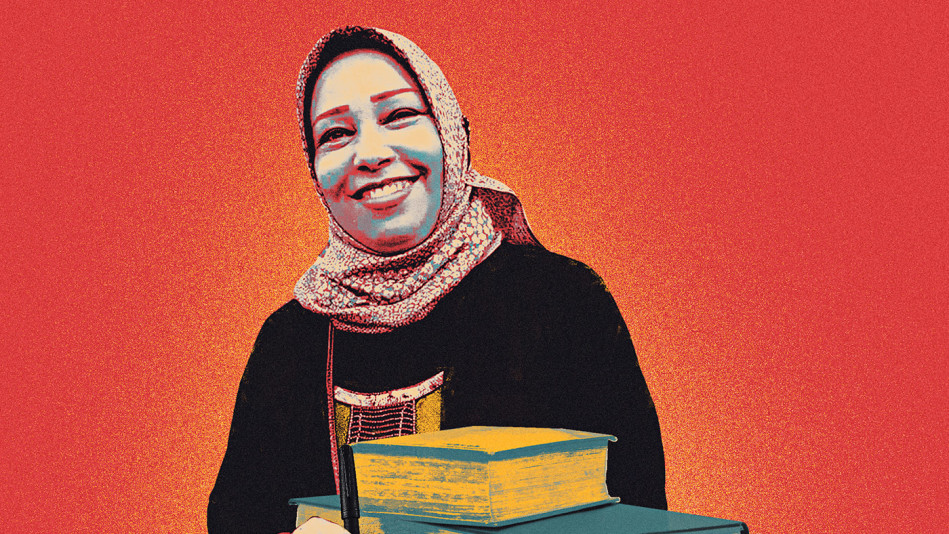Faleeha Hassan, "the Maya Angelou of Iraq," Wields a Mighty Pen
Author Faleeha Hassan's work put her life in danger—but that didn't keep her from her passion.

Illustration: Max-O-Matic
Faleeha Hassan has never not known war: The 50-year-old Iraqi was born in 1967, amid the ongoing Iraqi-Kurdish conflict; the Iran-Iraq War hit her homeland while she was in middle school, in 1980. (Officials decided they'd close her school "temporarily" until the war finally ended, which didn't happen until eight years later.) Her aunt had six sons go into combat; none came home alive. "We could never say, 'Now we'll rest,' " Hassan recalls. "The war is every day, every moment." To help deal with the horrors she witnessed—men dying at her feet as she searched for her father along a battle's front line; starving street dogs eating dead bodies to survive—Hassan turned to her writing, creating poems about love, family, womanhood, hope. And war.
In 1991, Hassan became the first woman in her home city of Najaf to publish a book of poetry, titled Because I Am a Girl. It was incendiary, and not only because of her brutal honesty about life in wartime: The image on the front was a woman's uncovered head. Hassan became a sensation—"the Maya Angelou of Iraq"—going on to publish 15 more books of poetry, several plays, two novels and dozens of short stories; her work has been translated into 14 languages. But in 2011, her accomplishments brought her a more terrifying kind of recognition: Her name landed on a militant group's death list. The list's publication essentially granted sympathizers permission to murder her. "In Iraq, being a thinker is dangerous," Hassan says.
She fled to Turkey with her two youngest children and spent months dealing with the UN to get resettlement paperwork. In August 2012, they moved into a modest apartment in New Jersey. There, Hassan taught herself English online and by watching Kevin Hart and Tyler Perry movies, and she has been writing prolifically in her adopted language ever since. Now her pen is a weapon in a more personal battle. "I'm fighting against prejudice and misunderstanding," she says. "In Iraq, it is hard to be a woman who writes. In America, it is hard to be a woman in a hijab. But if I write, and teach and raise up myself and other women, maybe equality and acceptance will come. Maybe there can be peace."
In 1991, Hassan became the first woman in her home city of Najaf to publish a book of poetry, titled Because I Am a Girl. It was incendiary, and not only because of her brutal honesty about life in wartime: The image on the front was a woman's uncovered head. Hassan became a sensation—"the Maya Angelou of Iraq"—going on to publish 15 more books of poetry, several plays, two novels and dozens of short stories; her work has been translated into 14 languages. But in 2011, her accomplishments brought her a more terrifying kind of recognition: Her name landed on a militant group's death list. The list's publication essentially granted sympathizers permission to murder her. "In Iraq, being a thinker is dangerous," Hassan says.
She fled to Turkey with her two youngest children and spent months dealing with the UN to get resettlement paperwork. In August 2012, they moved into a modest apartment in New Jersey. There, Hassan taught herself English online and by watching Kevin Hart and Tyler Perry movies, and she has been writing prolifically in her adopted language ever since. Now her pen is a weapon in a more personal battle. "I'm fighting against prejudice and misunderstanding," she says. "In Iraq, it is hard to be a woman who writes. In America, it is hard to be a woman in a hijab. But if I write, and teach and raise up myself and other women, maybe equality and acceptance will come. Maybe there can be peace."



